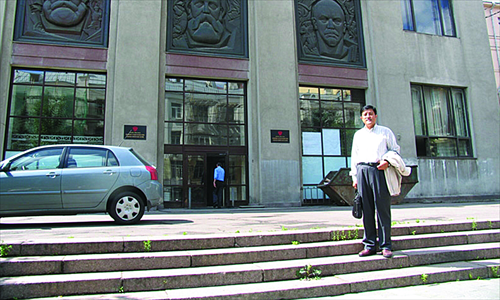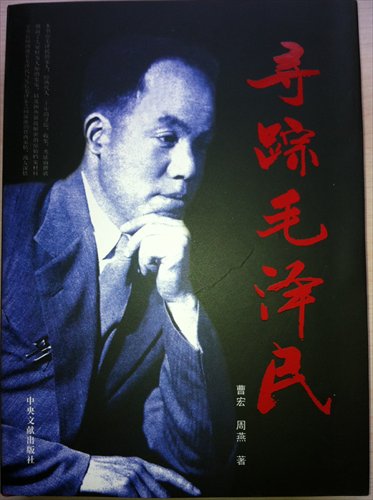Revolutionary Road

Cao Yunshan Photo: Courtesy of Cao Yunshan
When Cao Yunshan was born in 1949, his grandfather Mao Zemin had been dead for six years.
Mao Zemin was the younger brother and comrade of Mao Zedong, and followed him in the revolutionary road from 1919.
Mao Zemin was also the first president of the people's bank of Chinese Soviet Republic, founder of the modern Chinese banking system.
Cao, now 65, never met his grandfather and his parents never really told him about his relatives. Since finding out, Cao has been driven by a strong yearning to know the revolutionary experience of his grandfather.
He has spent more than 10 years retreading his footprints, traveling to almost all the provinces and cities where Mao Zemin stayed, visiting witnesses and inspecting revolutionary relics.
He has been to Russia three times, visiting the Moscow national archives for days, sifting through historic files like the personal resume, letters and diaries left by Mao Zemin during his eight-month stay of 1939-1940.
The Communist International kept detailed information on Chinese communists who visited the then Soviet Union before the relationship deteriorated in the 1960s.
"Mao Zemin was not only the brother of Chairman Mao but also a comrade," Cao told the Global Times. "However, it's a pity that there are few historical records about him.
"As a descendant, I firstly thought it was my duty to restore the real image of Mao Zemin as a legacy for later generations and the future."
Cao published two books revealing the story of Mao Zemin, the farmer who founded modern China's banking system.
He also filmed a documentary decoding the scarcely known stories regarding the relationship between Mao Zedong and Mao Zemin.

Cao Yunshan's book retracing the footsteps of Mao Zemin Photo: Courtesy of Cao Yunshan
Low key
"My parents kept low key about our family background," Cao, who said he was taught to be modest and respectful, told the Global Times.
Cao's mother Mao Yuanzhi withheld her surname Mao when introduced to others, worrying they would enquire about her relationship to her uncle. Her photo with Mao Zedong was locked in the bottom of a closet.
Cao believed he was just another ordinary kid until one day as a teenager he was shocked to realize his family was remotely ordinary.
"After I graduated from high school, I applied for a job in the air force who demanded a detailed family background check," Cao said.
"My father had to fill in the blanks on family relationships for me where he wrote down 'Mao Zemin,' my grandpa, younger brother of Mao Zedong."
The discovery answered many riddles, Cao said. He vaguely recalled attending a wedding in Zhongnanhai, China's top political compound, when he was 10.
The bride was Li Min, Mao Zedong's daughter. This was the first time he visited Zhongnanhai and also the first time he saw Mao Zedong.
In the wedding photo, Cao Yunshan and his younger sister Cao Liya are standing beside the Great Helmsman himself.
"I stood upright throughout the time, very much like a bodyguard protecting him," Cao said.
Now knowing his background, Cao felt driven to dig deeper.
"I felt pressured and obliged," Cao said. "I thought I should work and study harder in order not to tarnish the family name.
"I also felt curious about the revolutionary experience of my grandfather."
Cao went to countless libraries seeking historical information and records about Mao Zemin. He found next to nothing.
"During the revolutionary age, everything was in a chaos," Cao said. "No one had thought of keeping the archives during the turmoil of war."
Cao's mother Mao Yuanzhi had in fact realized the importance of recording family history. She herself had visited revolutionary sites, including Shaoshan, Changsha and Ganzhou, collecting abundant files about her father.
"At that time, we had no photocopiers," Cao said, "and so my mother had to write down everything by hand."
After his mother died in 1990, Cao pledged to finish her unfinished business.
"I had to fulfill my mother's last wishes," Cao said.
He visited Shaoshan, birthplace of Mao's family, famous stops on the Long March and the revolutionary base of Yan'an. Cao began more seriously exploring roots in 2000 after he retired from his post at a State-owned company.
He went to Xinjiang where Mao Zemin used to work and talked to witnesses. Through constant visits, the path of Mao's family, the farmer-turned-banker, began to become clear.
"My grandpa was thoughtful," Cao said.
Mao Zemin dropped out of school at 14 and supported the family by doing farm work and running small businesses.
He became a Communist Party member in 1921. In 1925, he assisted Mao Zedong in starting the local peasants' movements in Hunan and Hubei provinces that accelerated the revolution.
In 1932, the national bank of the Chinese Soviet Republic, was launched with Mao Zemin as its first president in Ruijin, Jiangxi Province.
"My grandpa was very sensitive to the changing financial situation, and he contributed greatly to establishing the basis of China's financing and banking system," Cao said.
Russian roots
Cao felt a strong responsibility to his country when he joined the army in 1968 and participated in the 1979 China-Vietnam War.
The war killed many of his comrades and he swore if he ever came out alive, he would research his grandfather's story.
Cao flew to Moscow and checked files. Unable to speak Russian, he depended on the help of Chinese embassy officials. He went to the embassy almost every day, begging for a translator.
Finding and reading the archives was time-consuming. Cao had to register, apply and wait for days before he could inspect a file.
It cost about $1 to copy one piece of paper. Cao spent more than $1,000 on copying the files and bringing them home.
Cao stumbled across a resume of Mao Zedong written by Mao Zemin, which aroused his curiosity.
"At that time, the Communist International was very interested and curious about Mao Zedong," Cao said.
"However, Mao Zedong had never visited the Soviet Union at that time, so when his young brother Mao Zemin came to the Soviet Union, they asked Mao Zemin to write some information about his older brother."
Cao now plans to lead a team of second-generation revolutionaries to Russia, helping them locate precious archives on their forefathers.
"History cannot be forgotten," Cao said. "We, as the descendants, can't rely on others to tell us the history. We have to restore that history ourselves."